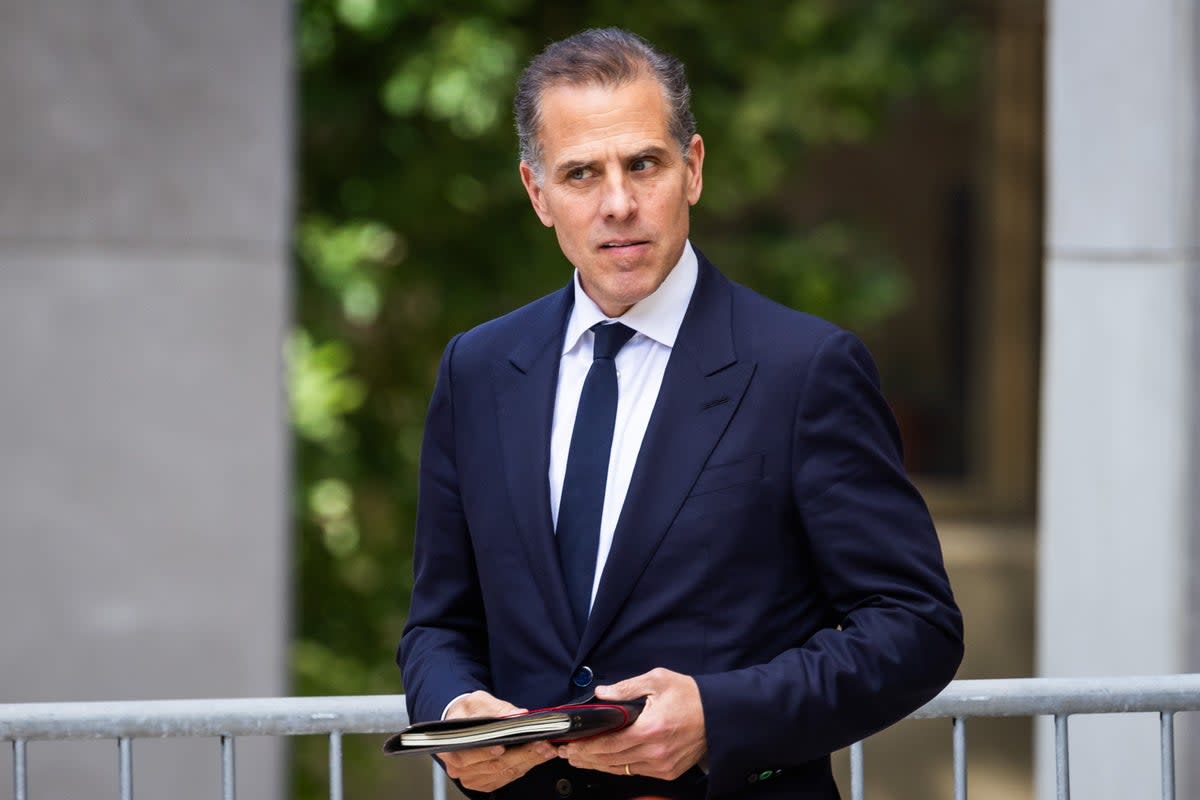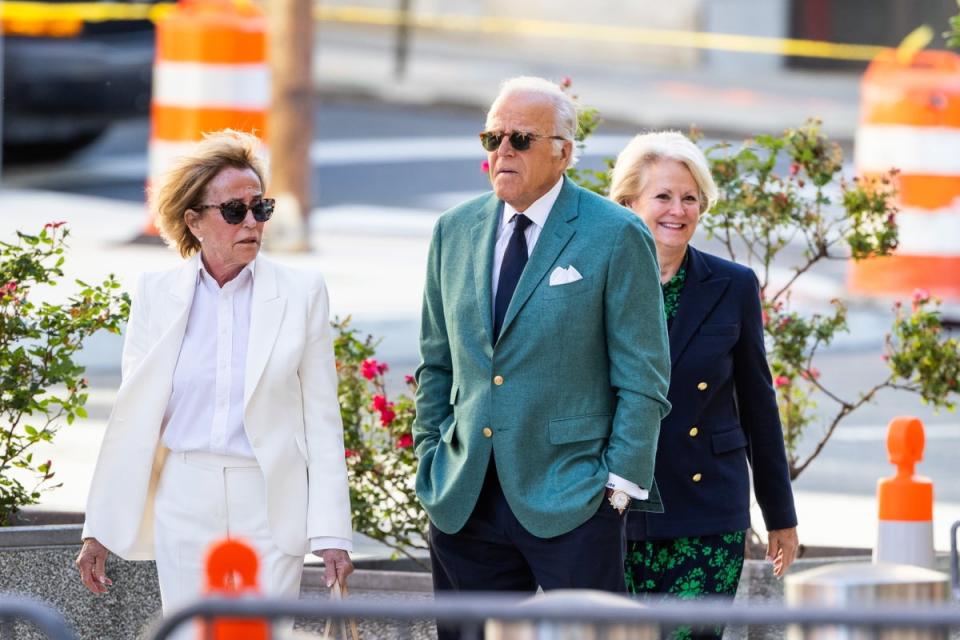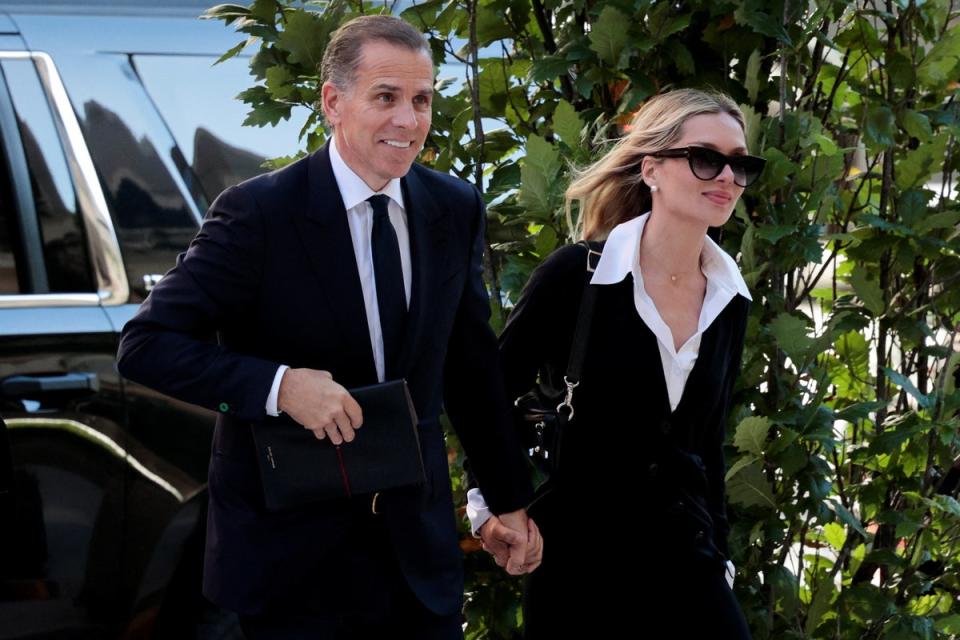Hunter Biden prosecutors says ‘ugly’ and ‘personal’ evidence was ‘absolutely necessary’ in closing arguments

The defense and the prosecution painted two starkly different pictures of Hunter Biden’s 2018 gun purchase during closing arguments on Monday.
Lawyers for Biden outlined a story of a recovering addict who genuinely believed he was on the mend when he checked a box saying that he wasn’t an active user of illicit drugs on a form to buy a firearm on 12 October 2018.
Meanwhile, the prosecution argued that Biden was well aware that he was an addict and an active drug user when he bought the 38 Colt Special at StarQuest Shooters and Survival Supply in Wilmington.
Biden is accused of knowingly buying a firearm while being addicted to crack cocaine, a violation of federal law.
The president’s son faces three counts: False statement in the purchase of a firearm, false statement in a record required to be kept, and being a drug user or drug addict in possession of a firearm.
During a discussion with lawyers and the judge before closing arguments, Biden was brought up to speak to the judge for the first time in the course of the trial. He was also seen speaking closely to James Biden, President Joe Biden’s brother during a break in the proceedings.

Ahead of closing arguments, the prosecution called FBI Agent Erika Jensen, who testified previously during the trial, back to the stand. She was assigned to Biden’s case last fall.
She testified that according to research she conducted over the weekend, text message history revealed that Biden was in Delaware in the time leading up to the gun purchase. The prosecution indicated that Biden may have been buying drugs at that time.
They also brought up testimony from last week in which Naomi Biden, 30, testified that her father was in New York during a three-day visit on 15 October.
But the prosecution shared evidence that Biden was still in Delaware as of 16 October that year. The prosecution used texts and Biden’s memoir Beautiful Things to argue that the president’s son often used 7/11s as meetups to purchase drugs. They attempted to use the texts and location data to show that Biden was still using drugs when he bought the firearm.

Prosecutor Leo Wise said during closing arguments that “the people sitting in the gallery are not evidence.”
Among those attending the trial were First Lady Jill Biden, the president’s sister Valerie Biden Owens, Hunter Biden’s half-sister Ashley Biden, Hunter Biden’s wife Melissa Cohen, and the president’s brother James Biden.
“They may have reacted” to parts of the evidence presented, but “none of that matters,” he added.
“Your responsibility to apply the law to the facts … is no more important or less important because of who the defendant is,” he said.
Biden looked straight ahead, avoiding the gaze of the jury during parts of the closing arguments.
Biden used crack and knew it during the “relevant time period,” Wise argued, noting that he went to rehab “over and over again.”
“The evidence was personal. It was ugly, and it was overwhelming. It was also absolutely necessary,” Wise said.

In his closing arguments, defense attorney Abbe Lowell noted that the salesman who sold Biden the gun, Gordon Cleveland, saw no signs “at all” that Biden may have been under the influence of either drugs or alcohol at the time of the purchase.
Wise reminded the jury of the testimony of Biden’s exes who said he “could present himself in a coherent way even when he was using.”
The prosecution does not have to prove that he used drugs on 12 October or between the 12th and 23rd, the day Hallie Biden discarded the firearm in a trashcan outside a grocery store, Wise argued to the jury. Hallie Biden is the widow of Beau Biden and had an on-and-off romantic relationship with Hunter Biden at the time.
What the government does have to prove is that there was a “pattern of use.”
The prosecution claimed that Biden was not only a drug user but an addict of crack cocaine, saying “That’s why he kept going to rehab, he couldn’t stop on his own.”
Lowell spent the bulk of his closing statement pushing the notion that Biden cannot be found guilty beyond a reasonable doubt, arguing that such rules are there to make sure no one is found guilty “improperly.”
“That burden stays with the government throughout the case,” he said, as he accused the prosecution of using “conjecture and suspicion.”
The defense lawyer used the analogy of a magician tricking his audience as he blasted the prosecution for supposedly not proving that Biden was using drugs within the relevant time frame.
“That statement wasn’t what he believed to be false,” he said regarding Biden filling out the form to buy the gun.
“The word ‘knowingly’ cannot be proved beyond a reasonable doubt,” he added. He also accused the government of trying to use Biden’s extensive drug use to “blur” the times he did use drugs with the times he allegedly didn’t.
He also appeared to try to take aim at the credibility of some of the government’s witnesses, noting that both Hallie Biden and Zoe Kestan, a fellow ex of Biden’s, received immunity to testify.
Two days after he bought the firearm, Biden texted Hallie Biden that he was “sleeping on a car smoking crack.”
Much like he argued that Biden may simply have been buying a donut and a coffee when he visited a 7/11, Lowell argued that Biden didn’t want to tell Hallie Biden where he was when he sent that text.
“He didn’t think he’d be in a courtroom five years later explaining how they talk to each other,” Lowell said.

 Yahoo News
Yahoo News 
